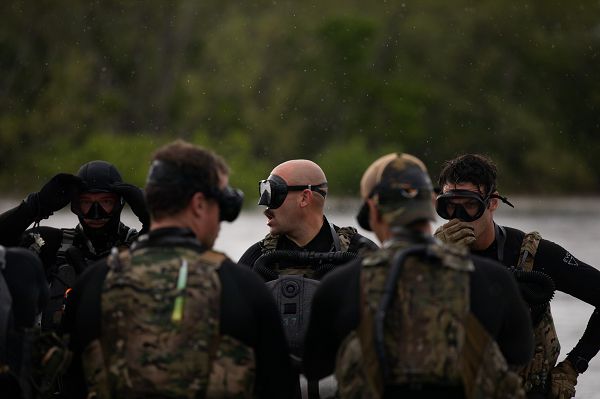
Naval Air Station Key West, Florida. (November 2, 2023): In a display of incredible stamina and skill, Team 4 from the Army’s 5th Special Forces Group won the Best Combat Diver Competition at the Special Forces Underwater Operations School, beating out the Navy SEALs.
The three-day event featured13 two-person teams from U.S. Army special operations and Navy SEALs competing in events that assessed their academic rigor, physical grit, and mental agility. Founded in 1964, the Special Forces Underwater Operations School is the premier institution developing expert special operators in underwater and maritime operations.
The school trains more than three hundred service members annually and assists another thousand troops in preparing for deployment or obtaining certifications. The school’s instructors are made up of the nation’s elite; Army Special Forces, Army Rangers, Navy SEALs, and Air Force pararescue men who are experts at submarine exfiltration and infiltration. The school offers a Combat Dive Qualification Course, a Combat Diving Supervisor's Course, and a Diving Medical Technician Course.
The advantage of using submarines to insert or recover special operators is the difficulty of the enemy detecting them. Done properly, these insertions occur and the adversary doesn’t know these commandos and the subs carrying them have ever been there.
Submarine-borne infiltration and exfiltration is one of the most dangerous missions in the military and requires diving from a submarine’s “lock-out” chamber. A certain number of Navy submarines are equipped with these so-called “trunks” that are used to get operators into and out of a submerged submarine. When the sub arrives at the infiltration point, the special operators enter the trunk wearing their scuba gear and the trunk is flooded to match the outside pressure. Once equilibrium has been achieved, operators open the trunk's hatch and head to their target, taking with them any necessary gear, such as inflatable boats.
This is the most dangerous part of the mission as a lot of things can go wrong. Operators can become disoriented, experience hypoxia, or suffer from oxygen toxicity and there is the ever-present threat of equipment malfunctions.
Underwater warfare is a tough, dangerous business taught by America’s finest special operations forces at this unique institution.


